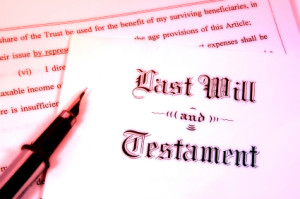 Exclusive to Ask Liz Weston, this post comes courtesy of Ally Bank.
Exclusive to Ask Liz Weston, this post comes courtesy of Ally Bank.
Whether you’ve worked for years or you’re just starting out, it makes sense to create a plan for distributing your assets after you’re gone. That’s where estate planning comes in. Estate planning may involve everything from creating a will to establishing trusts to designating guardians for dependents.
Below are a few common questions about estate planning addressed by several experts in the field.
What is estate planning?
Estate planning is the process of arranging for the disposal of your estate—your assets—during your life. In an interview with Ally Bank, Erin Baehr, president of Baehr Financial in Stroudsburg, Pennsylvania, stated, “all it really means is to organize the distribution of the things you own and the legacy you want to leave, large or small.”
Most estate plans are set up with the help of an attorney with experience in estate law. The core document in estate planning is the will, which describes which assets go to whom. Other aspects of an estate plan may include naming an executor of the estate, setting up durable power of attorney, and designating guardians for dependents. An estate plan usually will involve a trust.
In a recent interview with Ally Bank, Bruce D. Steiner, an attorney at the New York City firm Kleinberg, Kaplan, Wolf & Cohen and editorial advisory board member at Trusts & Estates, explained, “For most people, the focus is on what their will says. And in their will, if they’re sufficiently wealthy, and they give things away during their lifetimes, they almost always do it in some sort of a trust.”
Why establish a trust?
You want to ensure your beneficiaries receive what you intend to give with as few legal hurdles and unnecessary taxes as possible. A trust is a legal document that protects and controls your assets. Diane Morais, Ally Bank Deposits and Line of Business Integration Executive, explains, “As the economy stabilizes and Americans aim to grow their personal investments, Ally Bank suggests that savers protect the assets they have worked so hard to attain. Trusts can protect their legacies.”
Morais also noted in a recent article in The Huffington Post that many people are looking for bank products that work well with trusts: “With many Americans now able to save for the first time in years, many are evaluating bank accounts that are ideally suited for trusts . . . to firm up their own savings while simultaneously easing the burden on their beneficiaries.” Many banks, including Ally Bank, have deposit products ideally suited for trusts.
Who is estate planning for?
Anyone can benefit from planning for the future. Steiner explains that estate planning is for “Anybody who has assets and would like them to go in a way that might be different than the way they would go by default. That’s really most people.” And according to Baer, “Everyone should have an estate plan, if for no other reason than to make things easier on the people left behind.”
When should you start thinking about estate planning?
The answer is unique to you and your situation. As you age and accumulate assets, you may be more inclined to start thinking about how to protect what you’ve worked for. Steiner suggested that a person’s family situation usually plays into his or her decision to get started with an estate plan. He notes, “It might be when [you] have a spouse, but for most people, I think it’s certainly when they have a child, since you have to decide, if you’re not around, who’s going to take care of that child? And if you leave money to a child, and the child can’t manage money, you have to decide who’s going to be the trustee for the child’s money.”
How should you prepare to meet with an estate planner?
As part of the estate-plan process, you will want to draw up a list of your assets, making it as complete as possible. You should include life insurance policies and retirement benefits. You also want to think about your wishes regarding family members, dependents, executors, trustees, guardians, and beneficiaries.
What are recent changes in estate planning law?
The American Taxpayer Relief Act of 2012 was approved earlier this year. Explains Steiner, “It permanently fixed the federal estate tax exempt amount at $5.25 million, as indexed for inflation. It made portability permanent, which means if I have a spouse and I don’t use my entire exempt amount, my spouse can inherit my unused exempt amount.”
Want to learn more about estate planning? Check out these posts:
Missed deadline could limit inherited IRA benefits
Inherited IRA may have more options than you’re told
Elderly mom isn’t the only one overdue for estate planning




